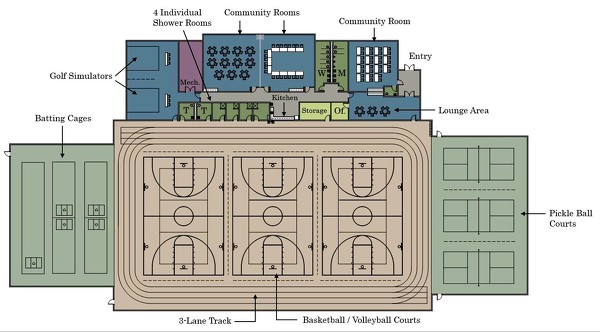Wednesday, July 3rd, 2019
Minster council tables talk on $5.25M center
By Sydney Albert

Submitted Photo
The floor plan for the proposed $5.25 million Minster Community Center includes indoor basketball and volleyball courts, batting cages, pickle ball courts, a three-lane indoor track, two golf simulators, several community rooms, a warming kitchen, lounge area and bathrooms and showers.
MINSTER - A resolution that would've put a 0.25% earned-income tax on the November ballot to build a proposed $5.25 million community center was tabled indefinitely on Tuesday to allow village council members time to seek more information.
After two and a half hours of discussion among council members, members of the private Committee for Sports and Recreation and various concerned citizens, council members and CSR members both agreed to table the resolution for now.
Some residents were concerned the proposed 45,000-square-foot facility, which would include indoor basketball and volleyball courts, batting cages, pickle ball courts, a three-lane indoor track, two golf simulators, several community rooms, a warming kitchen, lounge area and bathrooms and showers, would compete with their own establishments.
Patrick Hart, owner of Forever Fit 24/7, was concerned that if the facility were equipped with cardio and strength training equipment, his own tax dollars would be used to create competition for his business. The current proposed floor plan doesn't include space for such equipment, which CSR members pointed out.
Lesia Arnett, the current vice chair of the Auglaize/Mercer Counties Family YMCA, said she believed the center would directly impact the YMCA due to amenities such as the three-lane track and pickle ball courts. Arnett said 34% of the YMCA's South Branch membership was from Minster, and said that membership might drop if the group had to compete with the community center.
Under the recent management agreement with the Dayton YMCA, Arnett said the local YMCA had no debt and was seeing rising operating revenues, which the organization was using to expand and create new programs and improve its buildings. She didn't want to see the village hinder the organization's upswing.
"What can we do to collaborate rather than be in competition?" Arnett asked.
CSR members agreed they would be willing to meet with YMCA board members to discuss options. Village council members also expressed interest in talking more with YMCA officials about a possible partnership in managing such a building.
Several council members expressed discomfort at the tight timeline they'd been given to submit the matter to the Auglaize County Board of Elections without being able to perform due diligence. Though several believed the center would be popular and used by residents, they also said a proper needs survey or community survey had not been conducted by village officials themselves.
CSR members at the meeting noted they had asked for feedback from several focus groups, with ages of focus group participants ranging from 26-75, and they had received many positive responses to a survey at their website, minstercommunitycenter.com.
Council member Nicole Clune said the issue with the committee's online survey was that it required people to give their names and that in a small community, people who opposed the center might not feel comfortable putting up their names. Clune also said the process for the community center was backward, and council members were being asked to put the issue on the ballot and figure out the operating details later.
Council member Paul Enneking said the village has to first be comfortable with possibly taking ownership of the building before putting it before voters, and he still had many unanswered questions.
Council member Tom Herkenhoff said his biggest concern was that he didn't believe an earned-income tax was the best way to fund the project.
Council member Craig Oldiges believed the council would be doing the community a disservice to deny residents the chance to vote on the center. Clune replied the council members had been elected as representatives for a reason, both for their perspective on how to run the community and their experience. Residents relied on them to make governing decisions, he said. Oldiges pointed out that council members didn't necessarily have experience running a village before being elected and that they had to learn after being elected. He asked why they couldn't learn how to run the center after the public had voted on it as well.
Oldiges also protested the argument that council members had not been given enough time to think about the possibility of running the community center, saying the matter had been discussed for months. before committee members had presented their plan at the last council meeting. Oldiges later tried to clarify, saying the matter had been discussed in council committees rather than at actual council meetings.
Board members also granted permission to the Minster Alumni Tournament organizers to hold the tournament Aug. 9-11.


